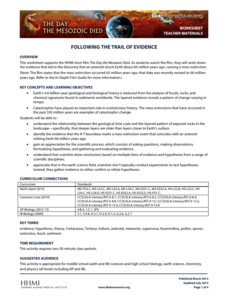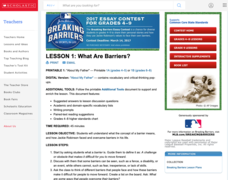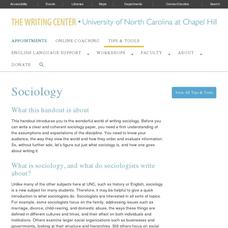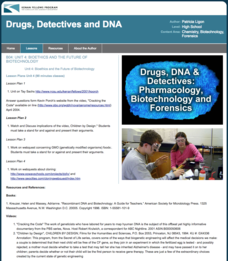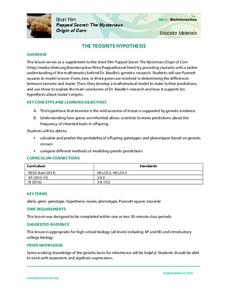Odell Education
Making Evidence-Based Claims: "The Souls of Black Folk" by W.E.B. Du Bois
Scholars dig deep into the text of W.E.B. Du Bois The Souls of Black Folk and analyze his position that black people must be aware of how they see themselves as well as how the world sees them. The instructor and readers work through the...
Literacy Design Collaborative
Macbeth: Influence of Supernatural
Something wickedly wonderful this way comes in a lesson that focuses on Macbeth. After a close reading of the play, class members craft a literary analysis essay in which they use evidence from the text to show how Shakespeare uses the...
College Board
Teaching Students How to Write AP Statistics Exam Responses
But this is math—we don't need to know how to write! The article makes a point that class members in AP® Statistics should be comfortable writing as the exams require it. Individuals quickly realize that quality writing is crucial to a...
Howard Hughes Medical Institute
Following the Trail of Evidence
One important skill in analyzing scientific evidence is identifying facts versus opinions. Scholars identify pieces of evidence from the film The Day the Mesozoic Died and then discuss this evidence in small groups at the end of each act...
Roald Dahl
James and the Giant Peach Lesson Plans
Immerse yourself in the world of giant bugs, rolling peaches, and brave little boys with an interdisciplinary unit on James and the Giant Peach. Young readers focus on the scientific themes of Roald Dahl's classic novel with bug hunts,...
Scholastic
Lesson 1: What Are Barriers?
Scholars discuss the concept of a barrier with a short passage on Jackie Robinson. The writing process begins with a paragraph and several other sentences about Robinson's unique traits that made breaking a barrier possible.
University of North Carolina
Literature (Fiction)
An informative installment of the Writing for Specific Fields series helps readers learn how to interpret and write about fiction. The website details nine easy steps for writing a literary analysis—a useful method for all readers!
University of North Carolina
Sociology
What exactly does sociology entail? Sociology is a broad field that covers many topics, including culture, mass media, and social movements. A helpful handout prepares scholars for typical writing found in college-level sociology...
California Department of Education
Me and My Career
Your career search starts here! Sixth grade scholars begin their journey toward college and career readiness in the first of a five-part series of lessons. Individuals identify where their interests lead them using the Holland code, then...
Kenan Fellows
Unit 4: Bioethics and the Future of Biotechnology
What's the future of biotechnology? Explore a hot topic in the fourth and final unit in a series of Biotechnology lessons. Learners develop an understanding of the many issues in bioethics, then create an argument for or against the role...
Stockton University Wordpress
Civil Disobedience: Is it ever ok to break the law?
As part of a study of civil disobedience, class members read excerpts from the writings of activists who were willing to break the law to protest unjust laws.
Fluence Learning
Writing About Literature: Comparing and Contrasting Characters in Heidi
Scholars read excerpts from the story, Heidi, in a three-part assessment that focuses on comparing and contrasting characters. Each part contains three tasks that challenge learners to discuss, answer comprehension questions,...
University of North Carolina
Evidence
You can claim that soda rots people's teeth or that dinosaurs were actually birds, but your claim will not stand up if it is not backed by evidence. A handout from UNC Writing Center, the seventh in the Writing the Paper series of 24,...
University of North Carolina
Statistics
Let's see you back it up! As shown in the 18th handout in the Writing the Paper series of 24 lessons from UNC, statistics help form an effective argument. The handout discusses how to analyze a source and break down the data to ensure it...
Howard Hughes Medical Institute
Developing an Explanation for Mouse Fur Color
Whether or not you think mice are nice, you'll love the colorful activity! Scholars examine evidence for evolution in the rock pocket mouse through video, discussion, and collaborative work. Learners watch a video regarding variation in...
Howard Hughes Medical Institute
The Teosinte Hypothesis
Don't want to sound corny, but your class will be a-maize-d by an engaging activity! Explore the history of the modern corn plant through a video and Punnett squares. Junior genetics experts get hands-on experience with actual research...
Howard Hughes Medical Institute
Human Impacts on Biodiversity
Have you always wanted to take your science class on an amazing field trip they will never forget? Now you can! Observe the wildlife in an African savanna through trail cameras with a five-part data analysis activity. Learners analyze...
Theodore Roosevelt Association
Interpreting the Past; Assessing Its Impact on the Present
Even though the presidency of Theodore Roosevelt ended over 100 years ago, we can still learn something from his stances and policies that is applicable today. Class members first look over a list of prevalent political issues from the...
EngageNY
Grade 9 ELA Module 4, Unit 1, Lesson 24
Who bears the most responsibility for ensuring that goods are ethically produced? Using evidence drawn from Sugar Changed the World: A Story of Magic, Spice, Slavery, Freedom, and Science, the unit's central text, and from the...
EngageNY
Grade 9 ELA Module 4, Unit 1, Lesson 22
Class members read "Satyagraha," the concluding section of Marc Aronson and Marina Budhos' Sugar Changed the World: A Story of Magic, Spice, Slavery, Freedom, and Science, and analyze how the authors support their claim that terrible...
EngageNY
Grade 9 ELA Module 4, Unit 1, Lesson 21
Class members read the chapter, "Serfs and Sweetness" from Sugar Changed the World, and identify the central idea that the development of beet sugar and modern farming technology changed the reliance on the plantation system and made...
EngageNY
Grade 9 ELA Module 4, Unit 1, Lesson 20
After comparing the working conditions of the enslaved people to those of the Indian indentured workers on the sugar plantations, class members examine the conditions and the actions of specific historical figures that Marc Aronson and...
EngageNY
Grade 9 ELA Module 4, Unit 1, Lesson 19
Building on the previous discussion of the supplemental reading article "Where Sweatshops Are a Dream," class members use the provided Evaluating Argument and Evidence Tool to identify the claims and evidence Nicholas Kristof uses to...
EngageNY
Grade 9 ELA Module 4, Unit 1, Lesson 16
The Sugar Changed the World chapter, "The Sound of Liberty," highlights how the differing attitudes toward the slave trade shifted the issue from an economic concern to a concern for human rights. The passage contrasts Thomas Jefferson's...





